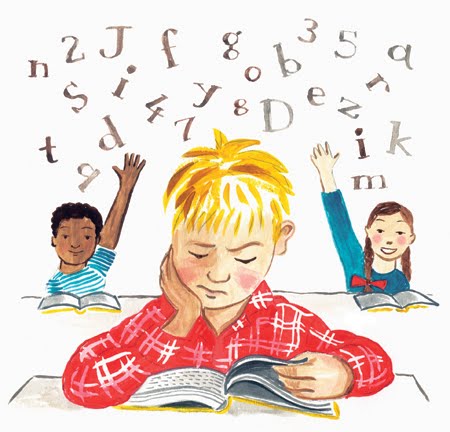
Dyslexia is a term defines as a learning disability that impairs a person’s fluency or comprehension accuracy in being able to read. The person also has difficult with phonological decoding, phonological awareness, auditory short-term memory, orthographic coding or rapid naming. The word comes from the Greek word means ‘difficulty with words’. A dyslexic person also have problem putting things in order, following instruction and may confuse the direction. The dyslexia person will have low self-estem, frustration and a severe loss of confidence.

There’s many research about this disease but it is not really understood.
Dyslexia symptoms
- Preschool children
In some cases, it may be possible to detect symptoms of dyslexia before a child starts school.
Possible symptoms include:
- Delayed speech development in comparison with other children of the same age
- Speech problems, such as not being able to pronounce long words properly and ‘jumbling’ up phrases – for example, saying ‘hecilopter’ instead of ‘helicopter’, or ‘beddy tear’ instead of ‘teddy bear’
- Problems expressing themselves using spoken language, such as being unable to remember the right word to use, or putting together sentences together incorrectly
- Little understanding or appreciation of rhyming words, such as ‘the cat sat on the mat’, or nursery rhymes
- Difficulty with, or little interest in, learning the letters of the alphabet
Early school years
- Symptoms of dyslexia in children who are 5-7 years of age include:
- Problems learning the names and sounds of letters
- Spelling that is unpredictable and inconsistent
- Problems copying written language
- Poor phonological awareness
Teenagers and adults
- Symptoms of dyslexia in teenagers include:
- Slow writing speed
- Poorly organised written work which lacks expression – for example, even though an older child may be very knowledgeable about a certain subject, they may have problems expressing that knowledge in writing
- Problems with reading fluency – reading fluency is the ability to read text smoothly, rapidly, and automatically, without having to use any, or little, conscious effort
Dyslexia adult syptoms
- It may be possible for someone with dyslexia to reach adulthood without the condition being properly identified. Signs that you may have dyslexia include:
- Trying to avoid reading and writing whenever possible
- Trying to conceal any difficulties that you have with reading and writing from other people
- Poor spelling
- Poor time management and organisational skills
- Relying on memory and verbal skills, rather than reading or writing
Source :- NHS
Dsylexia Treatment
Instruction for individuals with learning differences should be:
- Explicit—directly teaches skills for reading, spelling, and writing
- Systematic and Cumulative—has a definite, logical sequence of concept introduction
- Structured—has step-by-step procedures for introducing, reviewing, and practicing concepts
- Multisensory—engages the visual, auditory, and kinesthetic channels simultaneously or in rapid succession.
Adult Dyslexia checklist test
1. Do you find difficulty telling left from right?
2. Is map reading or finding your way to a strange place confusing?
3. Do you dislike reading aloud?
4. Do you take longer than you should to read a page of a book?
5. Do you find it difficult to remember the sense of what you have read?
6. Do you dislike reading long books?
7. Is your spelling poor?
8. Is your writing difficult to read?
9. Do you get confused if you have to speak in public?
10. Do you find it difficult to take messages on the telephone and pass them on correctly?
11. When you say a long word, do you sometimes find it difficult to get all the sounds in the right order?
12. Do you find it difficult to do sums in your head without using your fingers or paper?
13. When using the telephone, do you tend to get the numbers mixed up when you dial?
14. Do you find it difficult to say the months of the year forwards in a fluent manner?
15. Do you find it difficult to say the months of the year backwards?
16. Do you mix up dates and times and miss appointments?
17. When writing cheques do you frequently find yourself making mistakes?
18. Do you find forms difficult and confusing?
19. Do you mix up bus numbers like 95 and 59?
20. Did you find it hard to learn your multiplication tables at school?
If majority of the test is bringing you the ‘YES’ answer maybe you have the Dyslexia symptoms
Source :- Being Dyslexic
There are many famous person that have a dsylexia such as :-
1. Tom Cruise
2. Orlando Bloom
3. Steve Jobs
4. Cher
5. Walt Disney
6. Erin Brockovitch
7. Thomas Edison

Leave a Reply